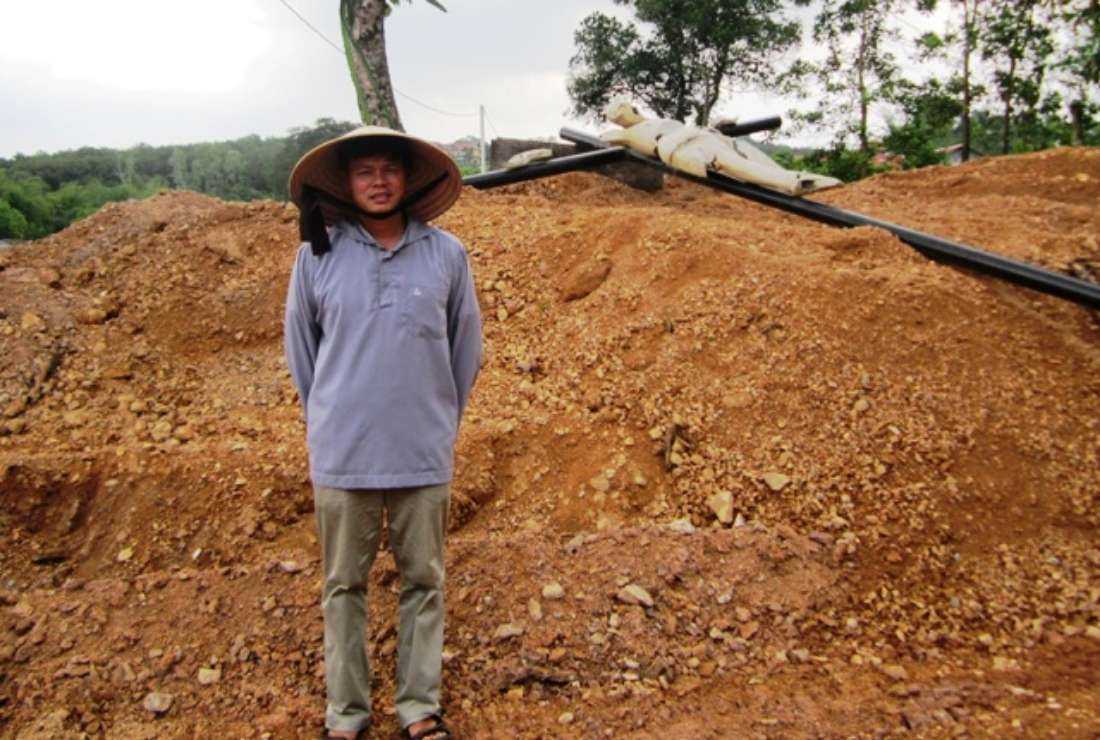
Father Anthony of Padua Nguyen Huyen Duc succumbed to cancer which doctors say could have been triggered by poisoning

Benedictine Father Anthony of Padua Nguyen Huyen Duc stands by a desecrated cross in 2017. (Photo supplied)
An exiled former head of a Benedictine monastery in central Vietnam, has died in Europe after a long battle with cancer that doctors suspect could have been caused by poisoning.
Father Anthony of Padua Nguyen Huyen Duc, 50, died on Oct. 4 in a hospital in Germany, where he had been undergoing medical treatment for lung cancer since 2017.
His death was announced by Abbot Louis Gonzaga Dang Hung Tan of Thien An Monastery.
Abbot Tan said the late Benedictine monk, who served as superior of the monastery in Thua Thien Hue province from 2014-2017, “was elected our abbot on April 25, 2019, but he could not return home to be installed.”
While still in Vietnam, Father Duc often condemned violent assaults allegedly carried out by local authorities against the Benedictines over a long-standing land dispute.
The police also damaged monastery facilities and desecrated a cross and a statue of Jesus that was erected on land, legally owned by the monastery since the early 1940s.
"We wish to seek justice in a peaceful manner to protect the Church's legal property until our last breath," he once said in a statement in 2017.
In a letter to Benedictine monks to explain his health problems, Father Duc said he suffered excruciating pain and hair loss after having drunk coffee and tea offered by two visitors during Tet or the Lunar New Year festival in 2016 at the monastery.
He had to undergo medical care in Germany where doctors diagnosed him with final-stage lung cancer and other severe diseases, and who suspected he might have been poisoned.
Father Duc’s health deteriorated and could not return home until September 2019, but when he flew to Hanoi he was questioned and told by security officers to leave the country for his own safety and in the interest of the monastery.
He stayed for ten days in the capital and returned to Germany.
In May, 2019, Nguyen Dung, a deputy of the People’s Committee of Thua Thien Hue Province, wrote to superiors of the Order of Saint Benedict and Benedictines in Vietnam, asking them not to re-nominate Father Duc as superior of Thien An Monastery and not assign him any work in the province.
Dung accused the monk of cutting down pine trees in forests and encroaching on public land controlled by the government, inciting national hatred and opposing the government.
The Thien An Monastery was founded on a piece of land spread over 107 hectares in 1940 by Benedictines from La Pierre-qui-Vire Abbey in France.
After 1975, the communist government reportedly "borrowed" 57 hectares of land from the monastery and assigned it to a forestry company.
In 2000, the government confiscated almost all the remaining land and assigned it to a tourism company, sparing some six hectares including the monastery, which the Benedictines were allowed to retain.
Help us keep UCA News independent
The Church in Asia needs objective and independent journalism to speak the truth about the Church and the state.
With a network of professionally qualified journalists and editors across Asia, UCA News is just about meeting that need. But professionalism does not come cheap. We depend on you, our readers, to help maintain our independence and seek that truth.
A small donation of US$2 a month would make a big difference in our quest to achieve our goal.

Share your comments